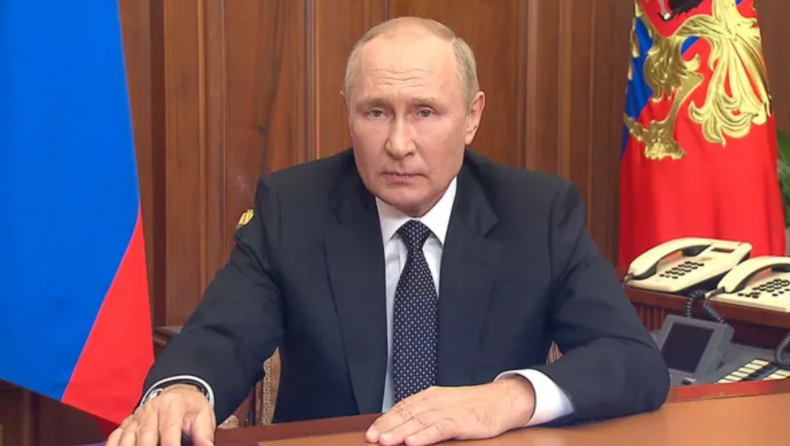Russian President Vladimir Putin announced the “partial mobilization” of Russian forces in an address to the nation on Wednesday, sparking an escalation in the ongoing war in Ukraine.
The announcement comes after the four Ukrainian regions annexed by Russia—Donetsk, Luhansk, Kherson, and Zaporizhzhia—announced on Tuesday that referendums will be held on the question of joining Russia.
Additionally, the partial mobilization announcement comes at a time when the world leaders have congregated for the 77th general assembly in New York, which will likely make it one of the top agendas to be discussed.
During the announcement, Putin also clarified that the “partial mobilization” will apply to military servicemen currently in the reserve with prior experience.
“Military service will only be applicable to people who are currently in the reserve, particularly those who have served in the armed forces, have certain military professions, and have appropriate expertise,” he declared.

Putin reasoned that the “partial mobilization” was the Russian response to “defend the motherland, its sovereignty, and territorial integrity” against western threats.
He stated that the west had attempted to “convert the people of Ukraine into cannon fodder” and that the “partial mobilization” was a necessary response to the threats posed by the west, which wants to destroy Russia.
By placing Russia’s population and economy on a wartime footing, the decree on partial mobilization will substantially alter the war picture.
In accordance with the decree, the contracts of the Russian troops engaged in combat in Ukraine will be extended till the termination of the partial mobilization period.
Since the Second World War, this is Russia’s first mobilization which has raised the level of tensions in the Ukraine War as Russia is also gearing up to hold referendums in the occupied parts of Ukraine.
Putin has warned the West that Russia possesses a variety of weapons of mass destruction, some of which are more advanced than those used by Nato nations, and that the available means will be deployed in case Russia’s nation’s territorial integrity is threatened.
He further added that “It’s not a bluff.”
Putin will have justification to use nuclear weapons as the referendums will be held in occupied Ukrainian territory to become part of Russia.
According to Russia’s nuclear doctrine, such weapons could be used if it is attacked by weapons of mass destruction (WMD) or if conventional weapons pose an existential threat to Russia.
Ukrainian Reaction to “partial mobilization” announcement
In an interview with the press, the Ukrainian president, Volodymyr Zelensky, said that he does not “think the world will allow” Putin “to use these weapons.” and expressed doubts about whether Putin would use these weapons.

Mykhailo Podolyak, the Ukrainian presidential adviser, said that in light of the fact that the Russian plan to overtake Ukraine was not going to plan, the “partial mobilization” announcement comes as no surprise but rather is a “predictable step.”
Global reaction
NATO Secretary General Jens Stoltenberg, on the sidelines of the United Nations General Assembly in New York, said that Putin is playing “dangerous and reckless nuclear rhetoric,” and this threat is not something new.
Furthermore, stating that the reaction by NATO will “depend on what kind of situation and what kind of weapons they (Russian forces) may use.”
Russia’s “no-limits” friend China has appealed for a “ceasefire through dialogue and consultation” that addresses the security concerns of both nations.
Putin’s announcement of the “partial mobilization” of Russian forces has also led to the selling out of one-way flights out of Russia, and the prices of the tickets continue to skyrocket.
The “partial mobilization” of Russian forces has put the world on the edge as the threat of a potential nuclear war looms.













